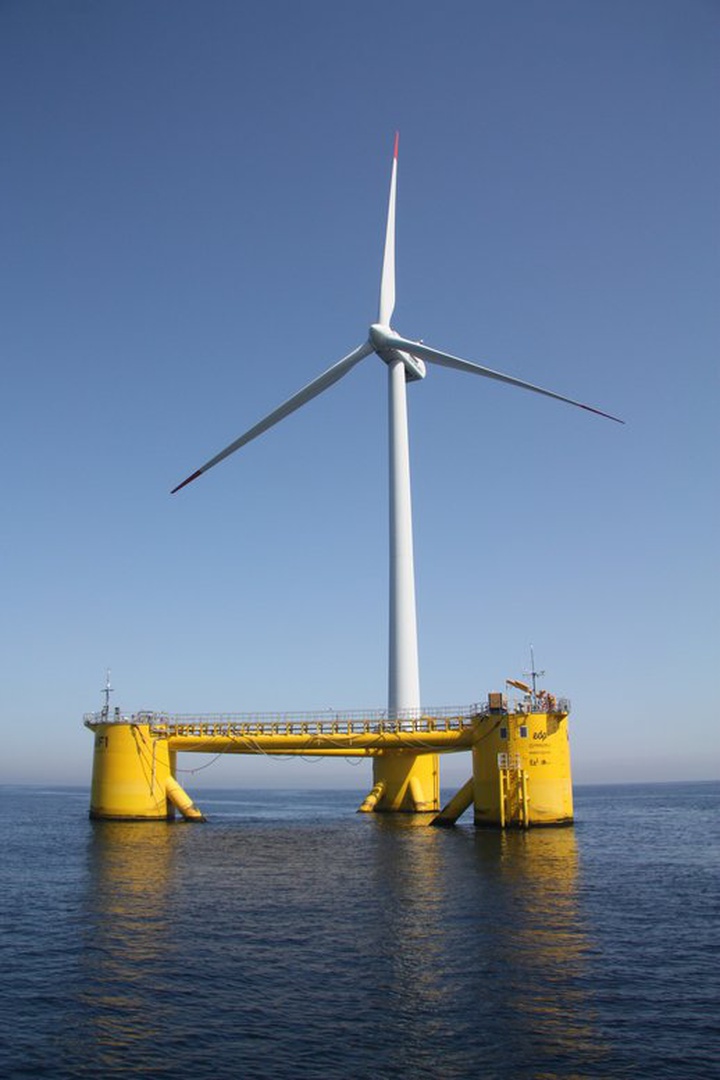Jessica Cejnar / Tuesday, Dec. 1, 2020 @ 5:51 p.m.
Touting Potential Economic Benefits, Crescent City Harbor District Commissions Offshore Wind Energy Study

Harbor commissioners have commissioned a study focusing on offshore wind energy production in Del Norte County similar this Portugal project. Photo courtesy of the U.S. Department of Energy
Though the Crescent City Harbor District will move forward with a study on the “pluses and minuses” of offshore wind energy production to Del Norte County, the decision wasn’t unanimous.
When making the case for a $12,000 partnership with Humboldt State University’s Schatz Energy Research Center to fund the study, commissioners Brian Stone and Wes White on Tuesday touted the potential economic benefits wind energy production could bring to the harbor.
The Crescent City Harbor District could house offices and maintenance facilities, berths for boats that would work on the offshore wind turbines as well as substations for pumping that electricity into the grid, they said.
However, their colleagues Carol White and Rick Shepherd, a commercial fisherman, said they were concerned about the environmental impacts those turbines would have on Del Norte County waters.
The Crescent City Harbor District Board of Commissioners voted 3-2 in favor of the Schatz Energy study. Carol White and Rick Shepherd dissented.
“The ocean has been my workplace for the last 48 years,” Shepherd said. “To change it in the way you’re talking about changing it, I couldn’t vote for it. I know it’s going to happen. It’s in the future. But it’s a sad day for me when I see something like that go on the ocean.”
During his presentation, Wes White noted California’s goals to go to clean energy by 2045, the benefits of wind as a renewable energy source over solar and other offshore projects in Scotland, Portugal, Maine and Virginia.
Wes White argued that offshore wind energy would be a cheaper more reliable energy source for Del Norte County and could be used as an impetus to get high power usage companies to relocate to Crescent City.
“We believe this study will shed light on the pluses and minuses of such a project offshore of Del Norte County,” Wes White said, adding that he and Stone have researched the possibility of wind energy production in local waters. “My sense is we need to be as knowledgeable as we can about this stuff because it’s going to happen somewhere offshore (in) California.”
Stone noted that in the last two weeks California Governor Gavin Newsom signed an executive order announcing that the state will end the sale of gasoline and diesel-powered cars by 2035. He also referred to potential wind energy development in Humboldt County, saying it’s “something like five years out, maybe six years out.”
“We may be a little bit further down the road, but we’ve already spoken to investors and all of them have indicated with a 95 percent-plus certainty that this is the area where they want to locate,” Stone said. “What we need to do is understand what’s going on. We need to have something in our hands so we can discuss how we manage what’s going to happen.”
Stone said that the potential for having a substation and other infrastructure supporting offshore wind energy projects at the harbor would help keep slip rates low for the fishing fleet and would help the keep the port “in the black in the future.”
“I think this is seed money that’s needed to keep us in the know and help us all understand what is possible,” he said.
Following her colleagues’ presentation, Carol White said based on her research, land-based wind turbines have caused a lot of ecological damage, impacting animals as well as humans that live nearby.
“Plus the last article I read said it cost up to four times more to put these out on the ocean as opposed to putting them on land,” Carol White said. “I’m with Rick I don’t think we should be messing with the ocean at this point, especially when fishermen are struggling to make ends meet.”
Shepherd also brought up the land-based wind turbine projects, pointing out the negative impacts they have on bird populations. He drew a comparison with regulations developed by the California Department of Fish and Wildlife to reduce whale entanglements in crab gear following a 2017 lawsuit by the Center for Biological Diversity.
“Those birds on the ocean are the ones we rely on to make our living,” Shepherd said. “It’ll be OK for wind energy mills to slaughter millions of birds, but fishermen are getting shut down for a whale. I just really dislike the whole idea.”
Commissioner Jim Ramsey, who sat in on his final meeting after choosing not to seek re-election, took a more neutral approach.
“I am in favor of getting off of fossil fuel dependency,” he said. “It’s a mess and it’s really destroying our environment.”
CLICK TO MANAGE